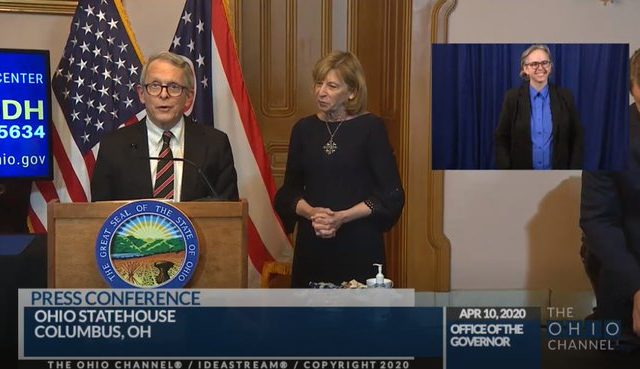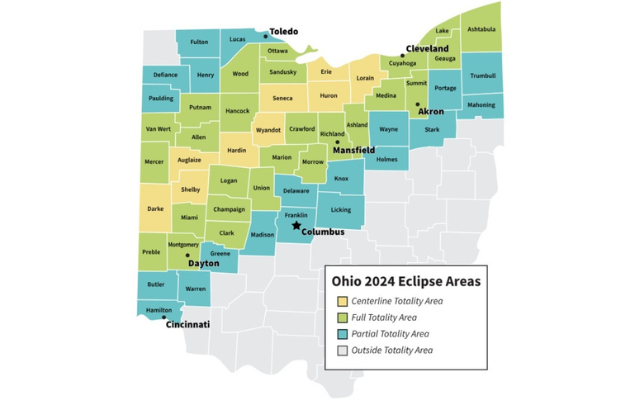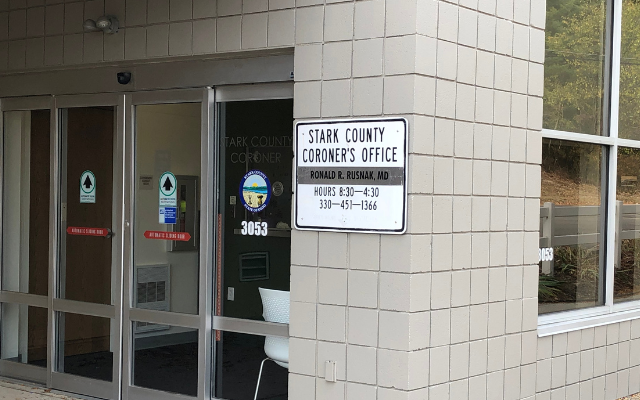Friday Update: New Coronavirus Data from CDC, Three More Dead in Stark County

COLUMBUS (News Talk 1480 WHBC) – Once again, Governor Mike DeWine along with other state leaders and health officials spoke in Columbus, providing updates on COVID-19 in Ohio. Here is an outline on everything that was discussed.
Update on cases
The Ohio Department of Health’s (ODH) latest report shows the state now has 5,836 confirmed cases from COVID-19 and 227 confirmed deaths. 1,755 Ohioans have been hospitalized so far from the coronavirus; 548 have been admitted into the intensive care unit.
More than 58,000 COVID-19 tests have been issued in Ohio. The Buckeye State has a positive test rate of nearly 10%.
.@DrAmyActon: Today’s #Ohio #COVID19 dashboard. pic.twitter.com/8v4i8U9ucf
— Governor Mike DeWine (@GovMikeDeWine) April 10, 2020
Three More Deaths in Stark County
The ODH report also shows three more people have died from the coronavirus in Stark County. Stark’s death total now sits at 11. It is now the eighth county in Ohio to reach a double-digit death total.
The County Health Department tells WHBC news that one of the newly reported deaths was a 76 year old female resident of Lexington Township with a history of underlying medical conditions. She passed away on April 9. There was no information available on the other two deaths.
There are 125 confirmed cases of COVID-19 in Stark County. 29 people have been hospitalized in Stark due to COVID-19.
Mahoning County Continues to be hit hard
Mahoning County is now up to 31 confirmed deaths from COVID-19, which is nine more than any other county in the state. There are 156 people hospitalized from the coroanvirus in Mahoning County. Mahoning has 358 confirmed cases.
New CDC Coronavirus Statistics
Governor DeWine opened his media availability on Friday speaking about a new way the state will report COVID-19 statistics. The new form data comes from the Centers for Disease Control and Prevention (CDC).
The state will report data in more detail than the new guidance requires. On April 5th, the Council of State and Territorial Epidemiologists (CSTE) put forth new case surveillance recommendations.
The CSTE is a national organization made up of member states and territories, representing public health epidemiologists or the scientists who study infectious diseases and their spread.
The CSTE provides technical guidance and assistance to states and to the federal partners, such as the CDC. The CDC recommends the state follow the new guidelines. Both sets of data will be posted on Ohio’s coronavirus website.
The new data will include cases that meet the following criteria:
- Quick Tests: These are the rapid tests that will soon be coming to Ohio. Doctors will simply be able to prick a patient’s finger, check their blood for antibodies and have a result in minutes. DeWine says these tests were not reported under the new guidelines
- A person will be counted if there is clinical evidence or epidemiological evidence of the presence of COVID-19.
- A person will be counted in this new total when there is no other likely diagnosis for COVID-19 even if there was no laboratory test.
DeWine says the figures from the original method will be reported, then the new method will be reported separately then the two methods will be combined.
More Hand Sanitizer!
Distilleries in Ohio have stepped up and now are producing large quantities of hand sanitizer. Governor DeWine says JobsOhio has purchased more than 3,100 cases, totaling more than 1 million oz. of much-needed hand sanitizer from Ohio distillers and will be donating it to Ohio Foodbanks.
Shipments of the hand sanitizer are arriving at distribution centers this week and will be delivered to Ohio’s 12 Food Banks next week and over the coming months as they need it.
The Governor thanked JobsOhio for helping Ohio Foodbanks, who can now in return continue to help many Ohioans during these difficult times.
New Food Truck Legislation
Although the state’s rest areas are not as crowded as they usually are, Governor DeWine says it’s important that Ohio truck drivers and other essential personnel have access to hot meals as they get food and other essential items to our grocery stores.
Last week, the Federal Highway Administration announced they would temporarily open rest areas to food trucks. Since then, ODOT has created a new permit.
The permit will allow food vendors to sell food to truck drivers and other essential personnel stopping at the state’s 86 rest areas. The permit is of no cost to the vendor and can be found on ODOT’s website.
Medicaid Changes
Governor DeWine says Ohio’s goal is to keep as many people as healthy as possible and ensure those that get sick with COVID-19 get the treatment they need. That includes reducing barriers to care.
Medicaid, the managed care plans, and MyCare Ohio plans have come together to remove barriers for members, those receiving Medicaid benefits, during this crisis. They have collaborated to maintain the health of individuals to keep them out of the hospital and reduce undue strain on our healthcare system.
DeWine says these groups are trying to reduce the administrative requirements of physicians and others to give them more flexibility, so that they can focus on safe patient care.
More details will be available at the state’s coronavirus website or or by calling the COVID-19 Call Center at 1-833-4-ASK-ODH.
Here is an overview of these changes:
- Medicaid has eased several pharmacy benefit restrictions.
- Prior authorizations will be by-passed for new prescriptions.
- Members will receive pharmacy benefits regardless of in-network or out-of-network provider status.
- The threshold for refills on certain prescriptions will be relaxed.
- Pharmacists who dispense emergency refills without a prescription will be reimbursed.
- Pharmacies that dispense over-the-counter medications without a prescription will be reimbursed.
- Member co-pays will be waived. This is for all prescriptions.
- 90-day supplies on maintenance medications will be authorized.
The managed care plans have already lifted prior authorizations for all but a few services. This took effect on March 27. Physicians and other providers, without prior authorization by a managed care plan, are using clinical judgment to determine if something is a medical necessity.
More Jobs Available!
Lt. Governor Jon Husted says there are 614 critical employers who have 38,000 jobs open. You can view those jobs at the state’s COVID-19 job portal.
Clarification on Non-Essential Surgeries
Dr. Amy Acton with the ODH spent a few moments today clarifying a previous order regarding non-essential surgeries. “We’ve heard anecdotally that there is confusion about what is essential and what isn’t essential,” said Acton.
Criteria for essential:
- Threat to the patient’s life if the surgery or procedure is not performed.
- Threat of permanent dysfunction of an extremity or organ system if not performed.
- Risk of progression or worsening of a condition or disease.
- Risk of rapidly worsening symptoms.
Acton says the bottom line is that patients should talk to their doctors.
“If a physician’s clinical judgment about a procedure is essential, then it should continue.”



